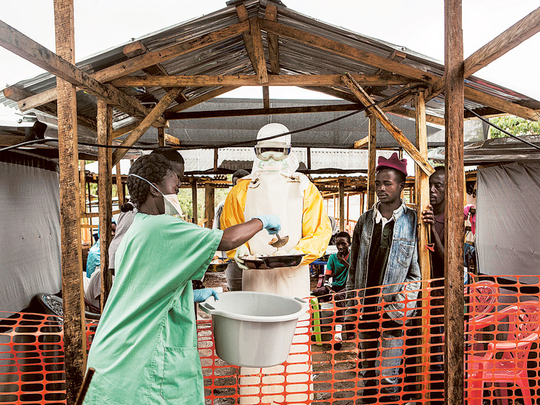
Freetown: Sierra Leone is to enforce three days of “complete shutdown” across the country later this month in a bid to contain the Ebola epidemic, a government spokesman told AFP Saturday.
The measure, which will come into force from September 19, means pedestrians and vehicles on non-essential business will be barred from movement for 72 hours.
“This will be strictly adhered to without exception,” government spokesman Abdulai Bayratay told AFP by telephone.
Authorities in Freetown will use the 72-hour quarantine window to give medical staff access to patients who have yet to be transferred to treatment centres, Bayratay said.
“In this regard, health workers as well as health-related NGO personnel will make house-to-house checks on homes for likely Ebola sufferers that relatives have hidden,” he added.
Bayratay said the shutdown would be aided by the arrival of several new ambulances and up to 30 military vehicles, and could be repeated in future.
The quarantine plan was announced after the World Health Organisation (WHO) said Friday that the death toll from Ebola since the start of the year had topped 2,000.
The virus has claimed 2,097 lives out of 3,944 people infected in Liberia, Guinea and Sierra Leone, the UN health body said.
As West Africa struggles to contain the biggest ever outbreak of Ebola, some experts say an unusual but simple treatment might help: the blood of survivors.
The evidence is mixed for using infection-fighting antibodies from survivors’ blood for Ebola, but without any licensed drugs or vaccines for the deadly disease, some say it’s worth a shot.
“This is something that’s fairly simple to do,” said Dr. Peter Piot, director of London’s School of Hygiene and Tropical Medicine and the co-discoverer of the Ebola virus.
Using blood of survivors is one of the experimental Ebola treatments under discussion at a two-day meeting that began Thursday in Geneva. The more than 200 experts assembled by the World Health Organisation are looking at issues of safety and effectiveness and considering which treatments should be prioritised for testing during the current outbreak.
There are about a half dozen medicines and vaccines in development. None has been rigorously tested in humans but early testing of one vaccine began this week in the United States.
Much attention has focused on the untested drug ZMapp, which was given to seven patients, two of whom died. But the limited supply is now exhausted and its developer says it will take months to make even a modest amount.
In contrast, WHO’s blood network, an international group of blood regulators, noted there are thousands of survivors from past Ebola outbreaks in Africa who could be tapped as a source of survivor blood.
The group recently issued a paper on how the strategy might be used. It said blood from survivors should be considered experimental and it recommended studies be done during the outbreak.
Some scientists think antibodies in the blood of Ebola survivors could help patients infected with the deadly disease. Antibodies are produced by the body’s immune system to fight off harmful things like viruses” they remain in the blood ready to fight off any future infections by the same foreign substance.
Pilot said it is vital to find out if the blood treatment is effective.
“I hope this is the last Ebola outbreak where all we have is isolation, quarantine and supportive care to treat patients,” he said.
Experts say blood from survivors could be collected and processed for multiple patients, or a survivor could donate blood to an individual patient. Both methods require screening the blood for diseases like HIV or malaria.
While direct donation would be easier, the levels of Ebola-fighting antibodies produced by a survivor can vary. Ideally, experts said, the amount of antibodies should be measured.
“With drugs, you can at least do some quality control,” said Tom Geisbert, an Ebola expert at the University of Texas Medical Branch at Galveston. “If you’re just taking blood blindly from (survivors) without testing it for antibody levels, how can we predict what outcome they will have?”












